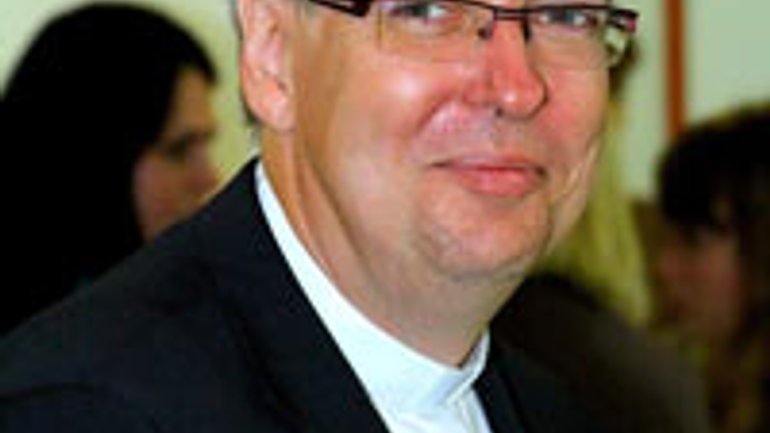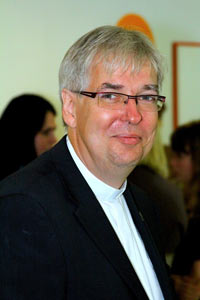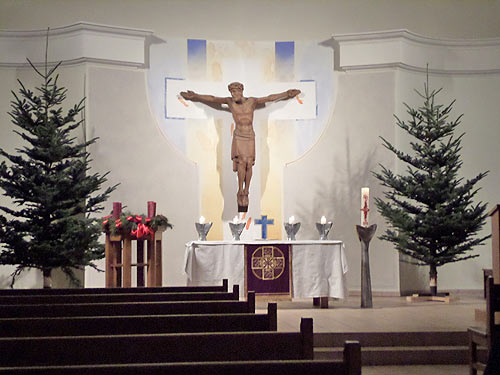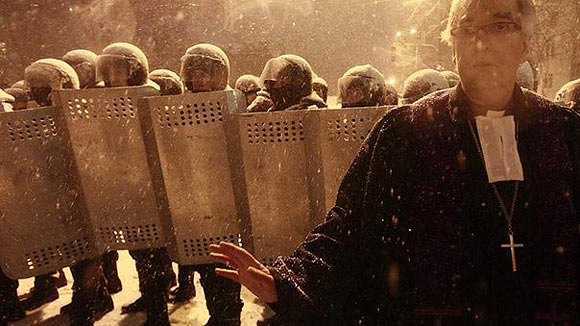Pastor Ralph Huska: ‘Just Don’t Revert to Violence’

 The evening of December 9, when a clash between protesters and troops of the Interior Ministry was waiting to happen, Ralph Huska, a pastor of St. Catherine's German Lutheran Church on Lutheran Street located in the middle of the events, stood between the rows of troops, not letting blood to spill. He shared his impressions from this event with a RISU reporter after evening prayers in the Lutheran church.
The evening of December 9, when a clash between protesters and troops of the Interior Ministry was waiting to happen, Ralph Huska, a pastor of St. Catherine's German Lutheran Church on Lutheran Street located in the middle of the events, stood between the rows of troops, not letting blood to spill. He shared his impressions from this event with a RISU reporter after evening prayers in the Lutheran church.
To get to the church is not easy. We had to pass through two cordons of officers who carefully obstructed the passage of buses. We had to explain to the aggravated guards that we had to go to the prayer session – otherwise we wouldn’t have been let through.
Life does not stop in the church. There is a constant flow of people entering the clean and bright room. Some of them help the pastors, others are participants of the Maidan who come here to eat, warm up, and stay the night. We came before prayers, so we had an opportunity to talk with Constantine, chair of the church council.
“The church welcomes everyone. We have no political or party affiliation, but we strongly oppose violence and promote peace. That is why the church is ready to accept anyone who seeks help. Do not think this won’t apply to you personally – it is impossible to know when and who will need support,” he said.
Guests-Protestors
It should be stressed that during the protests the number of guests in the church has grown tremendously. During a normal day at the Maidan, several hundred people came to the church; on days of assault, the number reached ten thousand.
According to Constantine, the troops who stand on duty also came for food and to warm up. However, their possibility to get warm and eat depends on their superior who can unofficially allow it or categorically forbid them from receiving help from the Christians.
Furthermore, additional prayers for the country and peace have been held in the Lutheran church. Another unique experience was an ecumenical prayer that brought together representatives of the Ukrainian Orthodox Church-Kyivan Patriarchate, the Ukrainian Greek Catholic Church, Roman Catholics, and some Baptists.
Prayer

At 6 p.m. the traditional prayer begins. On Saturdays service is in German, and Sunday in Russian and Ukrainian. There are few parishioners, but they first listen to the prayer in great silence, then sing together psalms and hymns.
At the end of the service, one of the protesters comes shyly into the room to join the prayer for Ukraine and for peace. Earlier, Constantine had said that the protesters sometimes turned to them with spiritual questions, but that the Interior Ministry troops never spoke about anything spiritual during their stay in the church.
Ralph Huska
After the prayer we had a chance to meet and talk with Pastor Ralph Huska. The photos of him stopping clashes between protesters and law enforcement officers went viral on the Internet. When I reminded him about these pictures, he noticed them on the stand at the entrance to the church and asked for them to be immediately taken down – they attract too much attention.

The pastor then spoke about the events of that evening. That night on Lutheran Street there was still a protest camp with tents, which was very abruptly invaded by the troops of the special forces, who formed a wall in front of the protesters. The priest noticed radicals in full “armor” and batons in hand. The sides were literally breathing into each other's face, so a clash was imminent.
Ralph Huska, clad in his liturgical vestment, went up to them, carrying a cross in his hand, and tried to split their ranks by calling for non-violence. He was helped by journalists who came to the scene and parted the rows with cameras and tripods.
A few more extraordinary tense moments passed while the angry protesters were ready to break and attack the special forces. The pastor began to walk between the rows of the anxious men, urging them not to shed blood and to not use violence. “Whatever you do, just please do not revert to violence,” he pleaded.
It took a little more time before deputies arrived, including Oleh Tyahnybok, who began to talk with the superior of the troops who invaded the camp. Then, the intense atmosphere of radicalism began to let up and the opposing parties significantly weakened their opposition. Ralph Huska had managed to intervene in the most critical moment, and as a result not a single drop of blood spilled on the asphalt.
“When I spoke to the head of the protesters from the Maidan, he said one thing – I already lived through a revolution in 1989 when I lived in East Germany. From my experience I can say that if you want to win and see changes, it is possible only through non-violence, and not using force,” he recalled.
As for his personal position regarding the Maidan, it is a positive, especially as there is a clear focus on peaceful protest. The pastor still has some disadvantages, such as his lack of knowledge of the Ukrainian language, because he cannot understand the calls and speeches from the stage. In conclusion, the pastor said that he hoped for a compromise to be reached and for a stable, peaceful life for the whole country.









